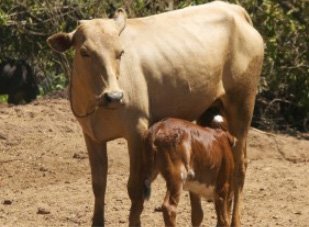Celestial Damnation and Indian Cows

The manifold benefits that the cattle bestow on us invoke diverse perceptions about these animals in religions as well as societies. For example, cattle slaughter and consumption of their meat is proscribed in several Indian towns as well as in Nepal for the reason that world religions such as Zoroastrianism, Jainism, and primarily, Hinduism, besides some others, object to it. You may surprise you to know that Ancient Greece, Egypt, Israel and even Rome shared these values.
Since medieval times, the cow was always venerated for the wealth it brought to the home with its several products, but it is in contemporary times that reverence for them has peaked.
The dependence of Hindus on milk and its by-products, namely, curd, butter and ghee, from the cows, not to speak of its dung that serves as fuel and fertilizer, their urine that has miraculous properties and their utility in tilling the fields, has raised the status of the cow from that of a custodian, to that of a maternal level, causing it to be revered as the “Gau Mata” (Mother Cow).
The Celestial Connection
The divinity of the cow has been conceptualized in different ways in the Hindu religion.
In standing with the belief that God is present everywhere and in all things, one can infer that all living beings too, including the cows have souls and it would be sacrilege and a sin to kill any animal, especially the cow. No one has the right to alter abnormally, the natural sequence of birth and death of any living creature, which, because of its unnatural death, will have to take the same form in its rebirth. The Vedic religion places a lot of importance on reverence for cows and bulls because, on the one hand, they symbolize “Dharma,” or the eternal law that rules the universe. In this context, it is refreshing to know that, Lord Krishna, an avatar of Vishnu, loved and tended cows for the love of it.
Rig Veda equates cows with the river Goddesses, and venerates them as symbolizing wealth. A festival called “Mattu Pongal”, celebrated in Sri Lanka and parts of South India represents this sentiment.
Atharva Veda tells us that different Devas find abode in the cow’s body
Brahma Samhita tells us how Krishna tended to his Surabhi cows in Goloka Vrindavana, his spiritual realm
Harivamsha portrays Krishna as “Bala Gopala”, the incarnate child cowherd and protector of the cow. Krishna is also identified as “Govinda” to symbolize the satisfaction the cows enjoy from his interaction with them. Other scriptures venerate the cow for its milk that cares for the population in its role as a mother of civilization, and contending that the greatest gift one can receive is a cow.
The Puranas depict the cow as Prithvi the Goddess of the Earth, whom the deities milked to save the land from famine. The story goes that Prithu, a Sovereign, and a part avatar of Lord Vishnu, chased Prithvi, the earth goddess, who escaped in the form of a cow, and ultimately agreed to give her milk to save humanity.
Kamadhenu is one of the principal celestial cows that appeared as an aftermath of the Gods and the Asuras churning the sea for Amrut. Referred in mythology as the mother of all cows and a cow of plenty, Kamadhenu is considered an embodiment of prosperity, and represents the sacred cow. As seen from poster art, all the Gods reside in the body of Kamadhenu.
Bhagavata Purana depicts cows as the celestial Surabhi, nurtured by Krishna, existing in the spiritual planes. Consequently, one can infer that, because human beings are born as the alter ego of the supreme lord, the cows, in turn, take the form and adapt the features of their celestial ancestor, the Surabhi.
The Celestial Damnation
With all these antecedents, how can one think in terms of slaughtering these innocent and venerable cows and bulls who offer nothing but their speechless service and products that enrich humankind? One look into their docile face is deterrent enough for such cruel action. They are slaughtered mercilessly for their meat, their hide, their hoofs and even tongues, in pursuance of human greed, not remembering the diverse benefits that they have bestowed on us. If this is not celestial damnation, what is?.
Help Us Now

Donate to Surabhivana Gaushala to save and protect Indian Cow Breeds.
All donations are exempt under Section 80G of the Income Tax Act, 1961. All donation receipts shall be mailed to the address given by the donor or may be collected in person, at request.
Click the below button to donate through credit cards/debit cards or Net Banking via Razor Pay.
